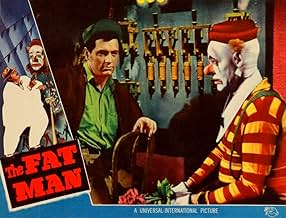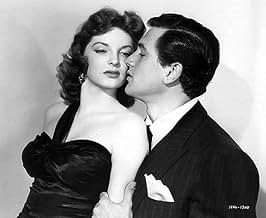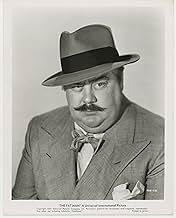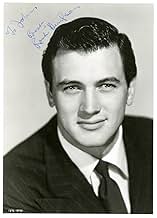CALIFICACIÓN DE IMDb
6.2/10
639
TU CALIFICACIÓN
El asesinato de un dentista es investigado por el corpulento detective Brad Runyan.El asesinato de un dentista es investigado por el corpulento detective Brad Runyan.El asesinato de un dentista es investigado por el corpulento detective Brad Runyan.
- Dirección
- Guionistas
- Elenco
Eric Alden
- Guard
- (sin créditos)
Parley Baer
- Police Detective O'Halloran
- (sin créditos)
Ray Bennett
- Phil
- (sin créditos)
Peter Brocco
- Racetrack Bookkeeper
- (sin créditos)
Douglas Carter
- Stage Manager
- (sin créditos)
Jack Chefe
- French Chef
- (sin créditos)
Opiniones destacadas
William Castle is today mostly remembered for his clever exploitative gimmicks, which made horror films like "Macabre," "House on Haunted Hill," "The Tingler," etc., both terrifying and fun.
But he started out making movies in another tradition—noir. Without gimmicks.
In 1951's low-budget "The Fat Man," made for Universal, Castle borrows from another medium, taking a popular radio mystery program and transforming a broadcast melodrama into an exciting yet droll movie thriller, with unexpected pleasures.
His lead, the basso profundo J. Scott Smart, is exceptionally good in his role as Brad Runyon, alias The Fat Man, a private detective who is not your average PI. Brad is a well-spoken, well-read, pleasure- loving, sweet-tempered, middle-aged, 270-lb mountain of a man wearing a quirky moustache right out of a Nineteenth-Century daguerreotype.
However, The Fat Man is neither a hog nor a dunce. J Scott Smart's full and fine performance turns an unconventional private eye into a charming and intelligent investigator who is much cleverer than anyone else around him. (He's also tough when need be, packing a snub-nosed .32, and even graceful when the occasion calls for it, wowing with his agile and bouncy, if pachydermic dance steps.)
After her employer is found dead, dental nurse Jayne Meadows (in real life, married to pioneering late night TV host Steve Allen) seeks out the food-loving Fat Man, who, in an entertaining intro, is showing a collection – a mélange, if you will -- of a great many chefs how to not spoil the broth.
Certain dental records are missing, and the nurse believes this may have something to do with the dentist's death. (Meadows plays the dental nurse with sympathy and with more than a little sadness.)
The unusual details of the dentist's death and his nurse's obvious distress hit a nerve, and The Fat Man takes on the case for nothing! (Always interested in filling himself, he just can't brush off such a toothy puzzle.)
The trail of the missing dental X-Rays leads Private Eye Runyon from New York City to California -- and to an ex-con, nicely played by a young Rock Hudson.
A sensible professional, Runyon works closely with the police, who cooperate courteously, if warily. Detective Lt. Stark, well-acted by Jerome Cowan, who himself a decade earlier had played Sam Spade's doomed partner in "The Maltese Falcon," treats him as a colleague, a refreshing change from the usual movie thriller adversarial relationship of PI vs. police.
However, another movie tradition, the great sleuth's assistant who is dumber than a pound of wet liver, is still upheld. In a nicely comic turn, Clinton Sundberg handles the chores this chowderhead is saddled with a sweet enthusiasm, submitting to all sorts of indignities with a cheerful grace. Take note that nowhere in this movie does he get a salary check or even a tip.
But The Fat Man has more to worry about than meeting a payroll. He has to sift through a couple more murders, outsmart a den of thieves, figure out the answers to an unsolved half-million-dollar armored car heist involving a posse of rent-a-cops, and face a mysterious, rather scary pratfall of clowns. (In much more than the usual gratuitous guest-star appearance, famous clown Emmett Kelly pops up here in a fully-realized three-dimensional portrayal. He even speaks – and well, at that!)
The plump private eye is put on the trail of a night-club entertainer played by the sultry Julie London, who possesses a valuable secret. Vulnerable under her veneer of hardness, the sensual beauty, who, in real life, was married to TV cop Jack Webb, sends Runyon in the right direction, leading eventually to an exciting show-down which is both scary and surrealistic.
Cameraman Irving Glassberg (celebrated for being one of the discoverers of Clint Eastwood) allocates his limited budget prudently, nourishing the film's noirishness with skill and finesse. His intelligent camera moves restlessly across patterned floors, picking up random gleams from the polished glass and metal of an elegant hotel lobby late at night, the few humans abroad seen as ominous shadows.
A circus subtheme effectively adds still another dimension to the film. At one point, for instance, the Fat Man rents a British two- seat sports car -- an MG or a Morgan -- that looks like it may be too tiny for a five-year-old, let alone a behemoth like himself. As he shoehorns himself into the tiny car, which isn't much more than a roller skate with a motor, you can practically hear it groan. The camera mercifully looks away, before we learn how he manages to squeeze out of it.
In another telling, even unsettling scene, what looks to be a whole platoon of bank guards in black SS-like uniforms tumble out of an armored truck, like one of those teeny-weeny circus clown cars that can hold an entire sideshow of grease-painted circus clowns plus their painted poodles and made-up monkeys plus a lifetime supply of inflated balloons .
Filmed only a few years after the Second World War, in crisp black and white, "The Fat Man," though an unpretentious B movie that sort of got lost in the crowd, is a rich chowder of admirable acting and appealing directorial details. Without gimmicks.
But he started out making movies in another tradition—noir. Without gimmicks.
In 1951's low-budget "The Fat Man," made for Universal, Castle borrows from another medium, taking a popular radio mystery program and transforming a broadcast melodrama into an exciting yet droll movie thriller, with unexpected pleasures.
His lead, the basso profundo J. Scott Smart, is exceptionally good in his role as Brad Runyon, alias The Fat Man, a private detective who is not your average PI. Brad is a well-spoken, well-read, pleasure- loving, sweet-tempered, middle-aged, 270-lb mountain of a man wearing a quirky moustache right out of a Nineteenth-Century daguerreotype.
However, The Fat Man is neither a hog nor a dunce. J Scott Smart's full and fine performance turns an unconventional private eye into a charming and intelligent investigator who is much cleverer than anyone else around him. (He's also tough when need be, packing a snub-nosed .32, and even graceful when the occasion calls for it, wowing with his agile and bouncy, if pachydermic dance steps.)
After her employer is found dead, dental nurse Jayne Meadows (in real life, married to pioneering late night TV host Steve Allen) seeks out the food-loving Fat Man, who, in an entertaining intro, is showing a collection – a mélange, if you will -- of a great many chefs how to not spoil the broth.
Certain dental records are missing, and the nurse believes this may have something to do with the dentist's death. (Meadows plays the dental nurse with sympathy and with more than a little sadness.)
The unusual details of the dentist's death and his nurse's obvious distress hit a nerve, and The Fat Man takes on the case for nothing! (Always interested in filling himself, he just can't brush off such a toothy puzzle.)
The trail of the missing dental X-Rays leads Private Eye Runyon from New York City to California -- and to an ex-con, nicely played by a young Rock Hudson.
A sensible professional, Runyon works closely with the police, who cooperate courteously, if warily. Detective Lt. Stark, well-acted by Jerome Cowan, who himself a decade earlier had played Sam Spade's doomed partner in "The Maltese Falcon," treats him as a colleague, a refreshing change from the usual movie thriller adversarial relationship of PI vs. police.
However, another movie tradition, the great sleuth's assistant who is dumber than a pound of wet liver, is still upheld. In a nicely comic turn, Clinton Sundberg handles the chores this chowderhead is saddled with a sweet enthusiasm, submitting to all sorts of indignities with a cheerful grace. Take note that nowhere in this movie does he get a salary check or even a tip.
But The Fat Man has more to worry about than meeting a payroll. He has to sift through a couple more murders, outsmart a den of thieves, figure out the answers to an unsolved half-million-dollar armored car heist involving a posse of rent-a-cops, and face a mysterious, rather scary pratfall of clowns. (In much more than the usual gratuitous guest-star appearance, famous clown Emmett Kelly pops up here in a fully-realized three-dimensional portrayal. He even speaks – and well, at that!)
The plump private eye is put on the trail of a night-club entertainer played by the sultry Julie London, who possesses a valuable secret. Vulnerable under her veneer of hardness, the sensual beauty, who, in real life, was married to TV cop Jack Webb, sends Runyon in the right direction, leading eventually to an exciting show-down which is both scary and surrealistic.
Cameraman Irving Glassberg (celebrated for being one of the discoverers of Clint Eastwood) allocates his limited budget prudently, nourishing the film's noirishness with skill and finesse. His intelligent camera moves restlessly across patterned floors, picking up random gleams from the polished glass and metal of an elegant hotel lobby late at night, the few humans abroad seen as ominous shadows.
A circus subtheme effectively adds still another dimension to the film. At one point, for instance, the Fat Man rents a British two- seat sports car -- an MG or a Morgan -- that looks like it may be too tiny for a five-year-old, let alone a behemoth like himself. As he shoehorns himself into the tiny car, which isn't much more than a roller skate with a motor, you can practically hear it groan. The camera mercifully looks away, before we learn how he manages to squeeze out of it.
In another telling, even unsettling scene, what looks to be a whole platoon of bank guards in black SS-like uniforms tumble out of an armored truck, like one of those teeny-weeny circus clown cars that can hold an entire sideshow of grease-painted circus clowns plus their painted poodles and made-up monkeys plus a lifetime supply of inflated balloons .
Filmed only a few years after the Second World War, in crisp black and white, "The Fat Man," though an unpretentious B movie that sort of got lost in the crowd, is a rich chowder of admirable acting and appealing directorial details. Without gimmicks.
When I was growing up, pre-television, we used to listen to many radio shows. One of these was The Fat Man, starring J. Scott Smart. This, as with some other radio shows, was made into a movie. The casting of Smart in the title role was good, since he looked the part and the sound was identical to the radio program.
In virtually every radio show, Bradford Runyan is hired to solve a crime; the film carries on the tradition. However, the radio program lasted for only a half hour, and even though there was a "time compression" effect, there was time to do significantly more in the film. As an example, Runyan asks a lady to dance, and when she accepts, he acquits himself well. That could never have worked on the radio program, to be sure.
For those of us who remember the program, there's a lot of nostalgia in the film. For those who never heard the show (such as my wife), it's still okay, but probably not as valued.
In virtually every radio show, Bradford Runyan is hired to solve a crime; the film carries on the tradition. However, the radio program lasted for only a half hour, and even though there was a "time compression" effect, there was time to do significantly more in the film. As an example, Runyan asks a lady to dance, and when she accepts, he acquits himself well. That could never have worked on the radio program, to be sure.
For those of us who remember the program, there's a lot of nostalgia in the film. For those who never heard the show (such as my wife), it's still okay, but probably not as valued.
I recently caught this film, and inspire of its ...slightly above middle-range rating, I decided to watch it.
After all, it's an early Rock Hudson film,but, for me, the real clincher was it had a rare film appearance by the incomparable Ms Julie London.
I'm too young to have experienced the age of radio (but, I did grow up listening, nightly, to CBS Radio Myster Theater to understand just how great it could be), and an eclectic group of actors, as well as directed by Mr William Castle made this too intriguing to not give a chance.
I'm very happy I did.
The story's a classic, 'whodunnit', and it's got all the 'bells and whistles' of a really good noir film (aside from inky-black scenes shot in various locations), including a couple of character actors who should be familiar to most - if not by name, nor appearances, but, by their singular voices, and mannerisms (Messers William Castle,and Marvin Kaplan, as the 'fat man's' assistant, bill, and as 'pinkie', an uncredited role as a delivery truck assistant/brother-in-law).
I never knew Mr Castle had made any noir films, a d after enjoying this one, I really wish he had, because, he knows how to use his abilities in this genre, and have them work to their fullest.
This is a real hidden gem!
After all, it's an early Rock Hudson film,but, for me, the real clincher was it had a rare film appearance by the incomparable Ms Julie London.
I'm too young to have experienced the age of radio (but, I did grow up listening, nightly, to CBS Radio Myster Theater to understand just how great it could be), and an eclectic group of actors, as well as directed by Mr William Castle made this too intriguing to not give a chance.
I'm very happy I did.
The story's a classic, 'whodunnit', and it's got all the 'bells and whistles' of a really good noir film (aside from inky-black scenes shot in various locations), including a couple of character actors who should be familiar to most - if not by name, nor appearances, but, by their singular voices, and mannerisms (Messers William Castle,and Marvin Kaplan, as the 'fat man's' assistant, bill, and as 'pinkie', an uncredited role as a delivery truck assistant/brother-in-law).
I never knew Mr Castle had made any noir films, a d after enjoying this one, I really wish he had, because, he knows how to use his abilities in this genre, and have them work to their fullest.
This is a real hidden gem!
The odd subtexts for this film are probably what has buried it. 1. It is based on a popular radio show that sold itself as "created by Dashiell Hammett." Actually the nickname "Fate Man" was that of Gutman, one of the baddies in the Maltese Falco; the character of the radio "Fat Man" was developed out of the otherwise nameless Hammett character "The Continental Op," hero of the Dain Curse and Red Harvest. But in 1951, when this film was about to be released, Hammett was getting sent to prison for thumbing his nose at the McCarthy-era 'House UnAmerican Activities Committee' witchhunters, so his name doesn't appear in the credits (at least not the copy I've seen). 2. With reference to Hammett removed, the character is redefined; while the character remains a tough private eye, he now has acquired a gourmand's taste for good cooking - an obvious reference to the popular Nero Wolfe Character - as well as a shadow of Wolfe's sidekick, Archie Goodwin. 3. This is an early film with Rock Hudson, and it is clear where he was intending to go with his career - a Montgomery Clift without the angst - but just as clearly he decided to change directions - too bad, he's actually quite good in this. 4. This is William Castle before he decided to throw himself wholeheartedly into gimmicky horror movies, and it reminds us that he could be a very capable director when he wanted to be. 5. That the a lead baddie is played by legendary clown Emmett Kelly probably doesn't mean much today, but it's certainly worth a footnote for those interested in the history of clowns.
The story, dialog and acting are all solid; the camera-work, lighting and design are nothing special but certainly competent. The pacing is pretty good. The film keeps its suspense up and provides enough twists to be a real detective mystery. Overall a satisfying mystery from the era when such could still be made.
The story, dialog and acting are all solid; the camera-work, lighting and design are nothing special but certainly competent. The pacing is pretty good. The film keeps its suspense up and provides enough twists to be a real detective mystery. Overall a satisfying mystery from the era when such could still be made.
The Fat Man opens with the murder of a dentist. We spend a good chunk of the next hour wondering not so much who did it, as why. It's a fairly straightforward plot, but one with many threads and characters, including a clown, some dental records, a just-released convict who comes into some money and then disappears, and a police detective who—unusually for private eye movies—is open, cooperative, and even intelligent!
J. Scott Smart looks comfortable in the role of Brad Runyan, aka the Fat Man. Familiar faces fill the rest of the cast, including Jayne Meadows in a good serious role as the dentist's nurse; Jerome Cowan as the helpful if bemused policeman; Clinton Sundberg as a kind of goofball assistant; and an eager-looking young Rock Hudson as the con and Julie London as his sometime girlfriend.
The Fat Man was apparently a radio detective making a jump to movies that didn't take; not having any familiarity with the radio program, I can only say that this portly detective is considerably more physically active than the obvious comparison: whereas Nero Wolfe rarely emerges from his brownstone on 35th Street, Brad Runyan thinks nothing of hopping a flight to California, risking life and limb in a shootout, or even dancing in a nightclub. (He does, however, share Wolfe's passion for fine food.) To put it another way—Smart as Runyan is easily closer akin to William Conrad as Cannon than Conrad as Wolfe.
The film as a whole offers bits of humor, some action, and a pretty fair mystery with quite a well done climactic scene. If they had indeed turned this into a series, I would seek out the other entries; however, I'm afraid 1951 was not the right time to start a detective series—at least, not one for the big screen.
J. Scott Smart looks comfortable in the role of Brad Runyan, aka the Fat Man. Familiar faces fill the rest of the cast, including Jayne Meadows in a good serious role as the dentist's nurse; Jerome Cowan as the helpful if bemused policeman; Clinton Sundberg as a kind of goofball assistant; and an eager-looking young Rock Hudson as the con and Julie London as his sometime girlfriend.
The Fat Man was apparently a radio detective making a jump to movies that didn't take; not having any familiarity with the radio program, I can only say that this portly detective is considerably more physically active than the obvious comparison: whereas Nero Wolfe rarely emerges from his brownstone on 35th Street, Brad Runyan thinks nothing of hopping a flight to California, risking life and limb in a shootout, or even dancing in a nightclub. (He does, however, share Wolfe's passion for fine food.) To put it another way—Smart as Runyan is easily closer akin to William Conrad as Cannon than Conrad as Wolfe.
The film as a whole offers bits of humor, some action, and a pretty fair mystery with quite a well done climactic scene. If they had indeed turned this into a series, I would seek out the other entries; however, I'm afraid 1951 was not the right time to start a detective series—at least, not one for the big screen.
¿Sabías que…?
- TriviaAs Jane Adams (Jayne Meadows) is searching the files for a dental record, she passes an index card bearing the name Ray Chandler, an inside reference to the detective-story writer Raymond Chandler.
Selecciones populares
Inicia sesión para calificar y agrega a la lista de videos para obtener recomendaciones personalizadas
- How long is The Fat Man?Con tecnología de Alexa
Detalles
- Fecha de lanzamiento
- País de origen
- Idioma
- También se conoce como
- The Fat Man
- Locaciones de filmación
- Productora
- Ver más créditos de la compañía en IMDbPro
- Tiempo de ejecución1 hora 18 minutos
- Color
- Relación de aspecto
- 1.37 : 1
Contribuir a esta página
Sugiere una edición o agrega el contenido que falta

Principales brechas de datos
By what name was Muerte en el circo (1951) officially released in India in English?
Responda


































